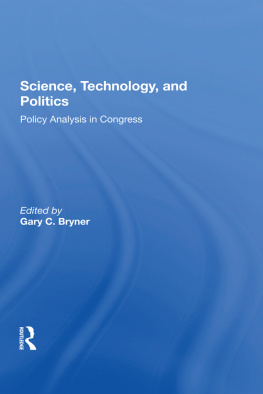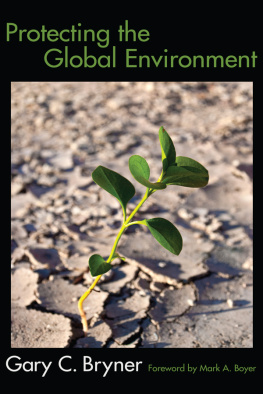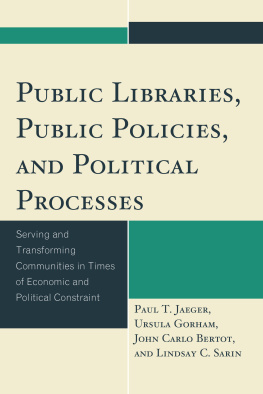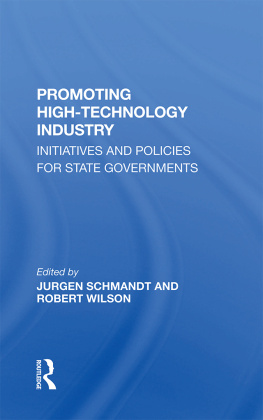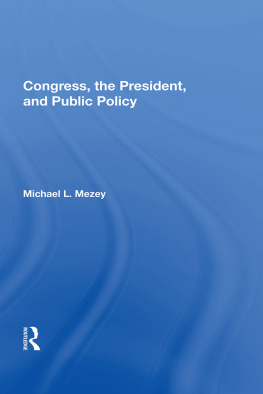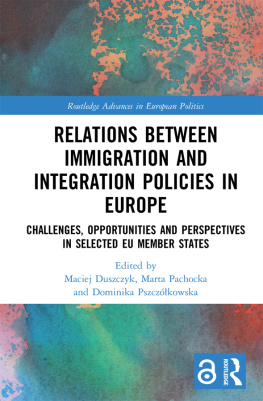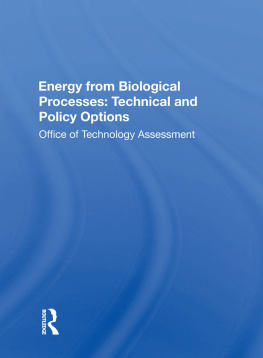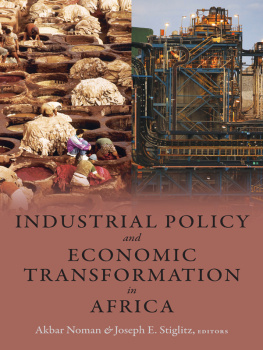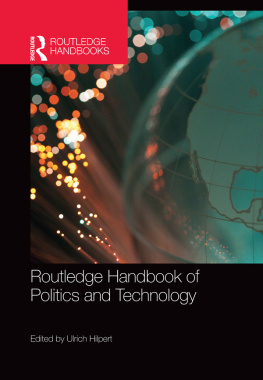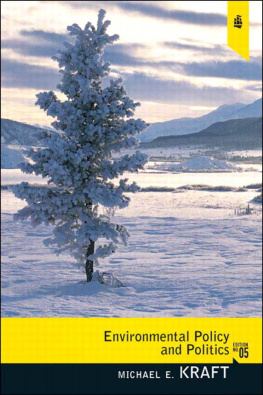Science, Technology, and Politics
First published 1992 by Westview Press
Published 2019 by Routledge
52 Vanderbilt Avenue, New York, NY 10017
2 Park Square, Milton Park, Abingdon, Oxon OX14 4RN
Routledge is an imprint of the Taylor & Francis Group, an informa business
Copyright 1992 by Taylor & Francis
All rights reserved. No part of this book may be reprinted or reproduced or utilised in any form or by any electronic, mechanical, or other means, now known or hereafter invented, including photocopying and recording, or in any information storage or retrieval system, without permission in writing from the publishers.
Notice:
Product or corporate names may be trademarks or registered trademarks, and are used only for identification and explanation without intent to infringe.
Library of Congress Cataloging-in-Publication Data
Science, technology, and politics : policy analysis in Congress /
edited by Gary C. Bryner.
p. cm.
Includes bibliographical references and index.
1. Science and stateUnited States. 2. Technology and state
United States. 3. United States. Congress. I. Bryner, Gary C.,
1951-
Q127.U6S3275 1992
338.97306dc20
92-371
CIP
ISBN 13: 978-0-367-28676-7 (hbk)
To Benjamin, future scientist
Contents
PART ONE
INTRODUCTION
, Gary C. Bryner
, E. J. Woodhouse
, William W. Keller
PART TWO
CASE STUDIES IN CONGRESS AND POLICY ANALYSIS
, Kathryn D. Wagner
, Michael E. Kraft
, W. D. Kay
, Robert H. Blank
, L. Christopher Plein and David J. Webber
, Priscilla M. Regan
, Gary C. Bryner
PART THREE
ASSESSING POLICY ANALYSIS: THE CHALLENGES OF TECHNOLOGY POLICY
, Norman J. Vig
, Gary C. Bryner
Guide
This book began several years ago as a project organized by members of the Science and Technology Studies section of the American Political Science Association. It is part of an ongoing attempt by members of the section and others to focus scholarly attention on the political and social implications of technological change and scientific advances. Part of the concern is to identify theories, conceptual frameworks, and concepts from political science that can usefully be applied to the study of science and technology. Part of the concern is to explore how science and technology-related concerns help illuminate and test some of the enduring theories of political science. We hope to contribute to the development of a strong theoretical underpinning for science and technology studies. We hope that such an enrichment of the theoretical bases for understanding science and technology-related phenomena will also contribute to more effective and appropriate public policies for regulating and encouraging scientific and technological developments. This book is an attempt to marry theoretical exposition and applied policy inquiry.
We are greatly indebted to a number of people who provided interviews, read drafts, and participated in meetings. Individual authors have indicated particular sources of support. Financial support for producing the volume was provided by Brigham Young University. We are particularly grateful to officials from the U.S. Office of Technology Assessment for their willingness to meet with us and discuss their views of policy analysis in a 1989 workshop at Georgia Tech University. We also greatly appreciate the opportunity to work with Amy Eisenberg and others at Westview Press. Their professionalism and interest in our work has made the entire project a most interesting and rewarding enterprise.
Gary C. Bryner
Robert H. Blank is professor of political science, University of Canterbury, Christchurch, New Zealand. He is the author of several books and articles, including Life, Death, and Public Policy .
Gary C. Bryner is associate professor of political science, Brigham Young University, and author of Bureaucratic Discretion, In Search of the Republic, and a forthcoming book on the new Clean Air Act.
W. D. Kay is an assistant professor of political science at Northeastern University. He has written a number of articles on large-scale technologies and is currently writing a book on the politics of technological development.
William W. Keller is a senior analyst and project director at the Office of Technology Assessment, United States Congress. His research focuses on multinational corporations, global arms trade, and defense technology. He is the author of The Liberals and J. Edgar Hoover: Rise and Fall of a Domestic Intelligence State and of a forthcoming book on state sovereignty and the proliferation of modern weapons.
Michael E. Kraft is professor of political science and public affairs and Herbert Fisk Johnson Professor of Environmental Studies at the University of Wisconsin, Green Bay. He is coeditor and contributing author of a number of books, including Environmental Policy in the 1990s, Technology and Politics, and Public Opinion and Nuclear Waste.
L. Christopher Plein is a Ph.D. candidate in political science at the University of Missouri-Columbia and is conducting research on the evolution of biotechnology as a policy issue. His larger research concerns include social responses to new technology and global economic developments.
Priscilla M. Regan is assistant professor in the Department of Public Affairs, George Mason University. She formerly worked as a senior analyst at the U.S. Congress Office of Technology Assessment and is currently writing a book on privacy, technology, and public policy.
Norman J. Vig is professor of political science at Carleton College. He is coeditor and contributing author of a number of books, including Environmental Policy in the 1990s and Technology and Politics . His current research focuses on environmental policy in the European Community.
Kathryn D. Wagner is a program officer in the Conservation and Environment Program, Pew Charitable Trusts. She was an analyst with the U.S. Congress Office of Technology Assessment and was an assistant professor of political science at Swarthmore College.
David J. Webber is associate professor of political science at the University of Missouri-Columbia and specializes in American public policy. His current research interests are policy makers use of policy information and biotechnology policy. He recently edited Biotechnology: Assessing Social Impacts and Policy Implications.
E. J. Woodhouse is a professor in the Science and Technology Studies Department, Rensselaer Polytechnic Institute. His research focuses on policy-analytic strategies for promoting more intelligent and more democratic policy making. His books include The Policy-Making Process , third edition, with Charles E. Lindblom and The Demise of Nuclear Energy: Lessons for Democratic Control of Technology with Joseph Morone.
Part One
Introduction
1
Science, Technology, and Policy Analysis in Congress: An Introduction
Gary C. Bryner
Introduction
Developments in science and technology pose profound challenges for humankind. The range of issues and the velocity at which change occurs are overwhelming. Air pollution, produced as a by-product of dramatic technological innovations in industry and transportation, threatens the health of millions of human beings. Projected changes in the global climate could disrupt agricultural activity, endanger water supplies, cause widespread flooding, and jeopardize the survivability of natural habitats and biodiversity. Medical and other wastes contaminate the aquatic food supply and imperil human health as they wash up on beaches.

